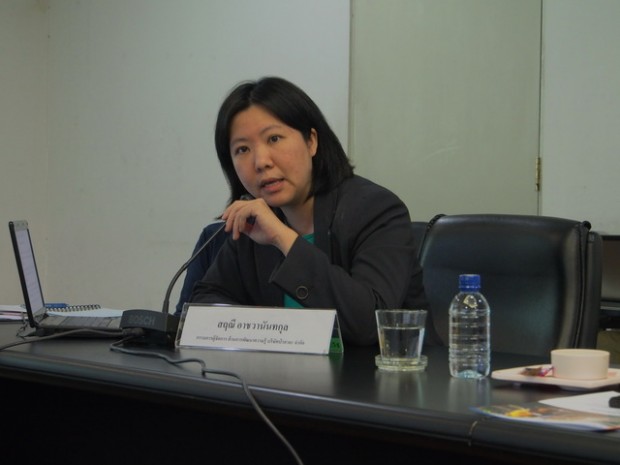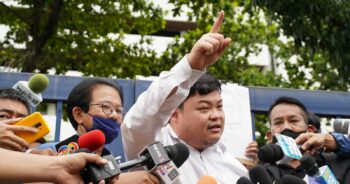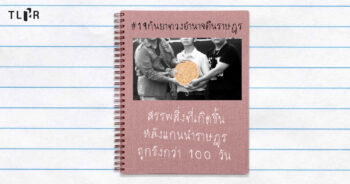Case Background:
On Monday 9th September 2019, Ms Sarinee Achavanuntakul and Mr Yuttana Nuanjarut, a news editor at the Krungthep Turakit newspaper, will appear before the Supreme Court to give testimony on charges of contempt of court. The court summons, dated 21st August 2019, included a copy of a memorandum sent by Mr Supradit Jeensawake, Secretary of the Election Cases Division of the Supreme Court, on 16th August 2019. The memorandum accused Ms Sarinee of contempt of court for writing an article entitled “The Perils of Excessive Rule of Law (revisited), Case of Media Shareholding by MP Candidates” in Krungthep Turakit newspaper on 14th May 2019. Mr Yuttana, a news editor of Krungthep Turakit newspaper and thereby “responsible for producing and supervising” its content, is named co-principal in the alleged offence.
The article in question concerned a case in which the Supreme Court’s Election Cases Division disqualified Mr Pubate Henlod, Future Forward Party MP candidate for Sakon Nakhon province, in March 2019 on grounds of being an owner or shareholder of a newspaper or mass media business, which is prohibited under Section 98(3) of the 2017 Constitution and Section 42(3) of the 2018 Organic Law on Election of Members of the House of Representatives. Mr Pubate is a partner in Mars Engineering and Service Partnership Ltd., a non-residential construction business. According to the Bangkok Post, the court claimed the company’s business objective was to operate radio, TV stations and newspapers. In fact, this was objective No. 43 on a list of around 80 types of businesses his company can, but may not in fact, operate. The list is on a standard form widely used by startups to register companies.
In her article, Ms Sarinee called the court’s interpretation of the facts “careless” (“muk-ngai” in Thai) and “extremely dangerous” and accused the court of making “a blanket conclusion that an ‘objective’ is the same as an ‘actual business operation’…” Ms Sarinee went on to say that this ruling was “a good example of the excessive rule of law”, or an “unremitting [“ta-phud-ta-phu” in Thai], excessive interpretation of the letter of the law by considering the facts but not considering the intention of the law”.
Ms Sarinee Achavanuntakul (Picture from thaipublica.org)
.
Allegation:
Mr Supradit’s memorandum alleged Ms Sarinee to be in contempt of court per Section 32(2) of the Civil Procedure Code, which states that:
“Whoever is the author, editor or publisher of any newspaper or printed matter published to the public shall, irrespective of whether he knew of the contents or publication of such newspaper or such printed matter, be said to have committed a contempt of Court in either of the two following cases:
(1) […]
(2) When such newspaper or printed matter, during a trial of a case up to final judgement, contains or expresses in any way whatsoever any information or opinion intended to influence the public sentiment or the Court or any party or witness in the case, which appears likely to prejudice the fairness of such case, such as:
- A misrepresentation of the facts of the case, or
- A biased and inaccurate report, summary or comment of the proceedings of the case, or
- An unfair comment on the conduct of the case by a party or on the evidence or character of a party or witness, including a statement of facts prejudicial to the reputation of such party or witness even though the same be true, or
- An inducement to committing perjury.
For the purpose of this Section, the definitions in Section 4 of the Press Act., B.E. 2476 shall apply.”
Legal Opinion:
Regarding Section 32(2), Mr Supradit contends that Ms Sarinee’s article “has influence over public sentiment, or over the court, or over litigants, or over witnesses during other future court trials related to the right to stand for election to the House of Representatives, which may involve the same issue that the author mentioned…”(emphasis added). However, Section 32(2) clearly states that contempt of court charges against such potentially-influential publications are only warranted “during a trial of a case up to final judgement” and where said influence “appears likely to prejudice the fairness of such case” (emphasis added). Nowhere does Section 32 criminalize having a potential influence over “other future court trials”, such as Mr Supradit contends Ms Sarinee’s article to have. Indeed, were such a law to exist, or should the allegations against Ms Sarinee be upheld on Monday and set a precedent for future cases, this would be a serious restriction of freedom of the press, the right to freedom of expression and the independence of the media. It could pave the way for future arbitrary press gagging orders by the government or judiciary for describing facts or expressing opinions concerning already closed cases, simply due to an influence those facts and/or opinions may or may not have on similar cases which may or may not occur in the future.
Regarding Section 32(2)(a) and (b), Mr Supradit alleges that the article is a “biased and inaccurate description of legal procedure” since it “accuses the Supreme Court’s Election Cases Division of unremittingly using the law, implying that the Supreme Court’s Election Cases Division has continuously misinterpreted the law without considering the troubles inflicted on others”. In fact, argues Mr Supradit, “the Supreme Court’s Election Cases Division has the authority to consider and reach a verdict on the right to stand for an election of members of the House of Representatives (cases related to MP candidates’ qualification) according to Thailand’s Constitution and the 2018 (B.E. 2561) Organic Law on the Election of Members of the House of Representatives.” However, Ms Sarinee’s article does not contend the Division’s authority to consider candidates’ qualifications, rather she contends its abuse of that authority and misinterpretation of the law it is authorized to interpret. Mr Supradit thus fails to show how this contention is “biased and inaccurate”. In fact, the memorandum attests to the fact that “Although in practice, such company does not operate any newspaper or mass media business, the Supreme Court’s Election Cases Division interpreted the candidate as being an owner or a shareholder of a company operating a newspaper or mass media business.” Ms Sarinee’s opinion that this was a wrong interpretation given the facts is explained when she says the court deemed that “an ‘objective’ is the same as an ‘actual business operation’”. Her clear explanation is neither biased nor inaccurate.
Regarding Section 32(2)(c), Mr Supradit claims that Ms Sarinee “did not criticize the Supreme Court’s Election Cases Division in good faith but intended to attack or rebuke the Supreme Court’s Election Cases Division interpretation of the law as unremittingly careless.” According to him, “the use of the words ““careless” (“muk-ngai”) and “unremitting” (“ta-phud-ta-phu”) is not academic, but has the sole purpose of disparagement”.
One might ask how, without asking its author, Mr Supradit was able to establish the “sole purpose” of the article and whether it was written “in good faith” or otherwise. Nevertheless, should any of the allegations regarding Section32(2)(a), (b) or (c) be found true, they could only render the article in contempt of court had it been published while the case described was ongoing and awaiting the court’s final verdict. In fact, Ms Sarinee’s article was published on 14th May 2019, two months after the Supreme Court’s final judgement in Mr Pubate’s shareholding case. The article was therefore a legitimate piece concerning the Supreme Court’s conduct in a past, already concluded case and having no specific prejudicial influence on current or future cases. Ms Sarinee used her rights to freedom of opinion and freedom of expression and the right to freedom of the press and was not in contempt of court.
Any other verdict on Monday would set a dangerous precedent for future unwarranted restrictions of these universal human rights.
Sources:
https://tlhr2014.com/?p=13620&lang=en
https://www.bangkokpost.com/thailand/politics/1668132/media-share-minefield
https://www.bangkokpost.com/thailand/politics/1739051/courts-act-against-media-shareholding-critics




